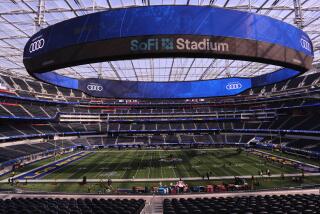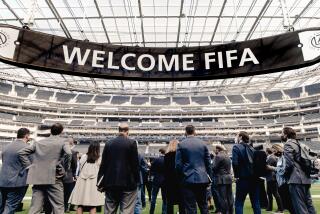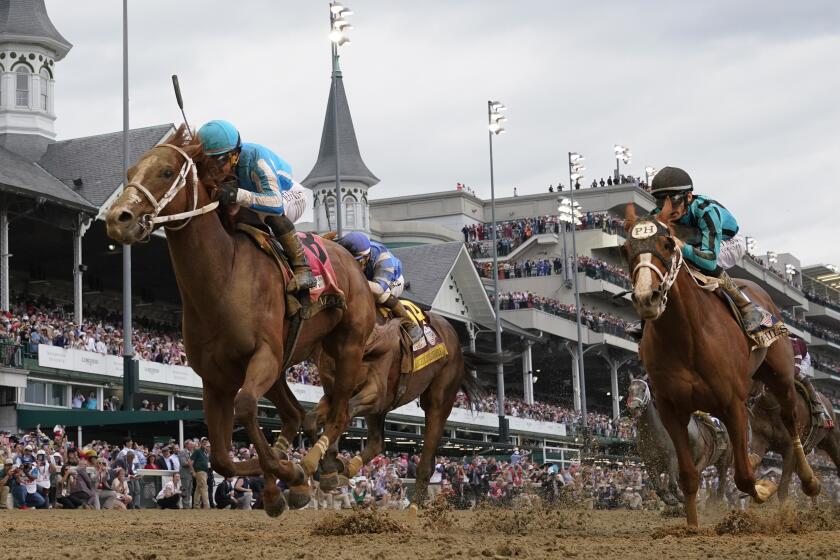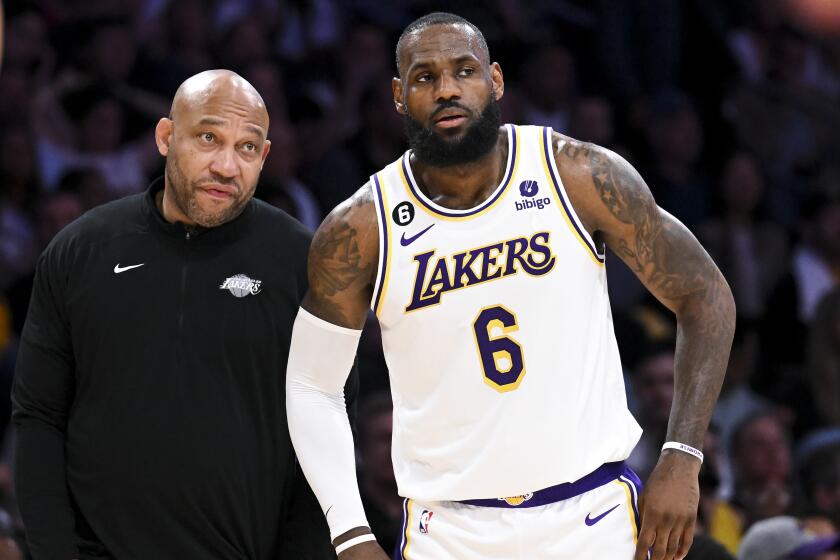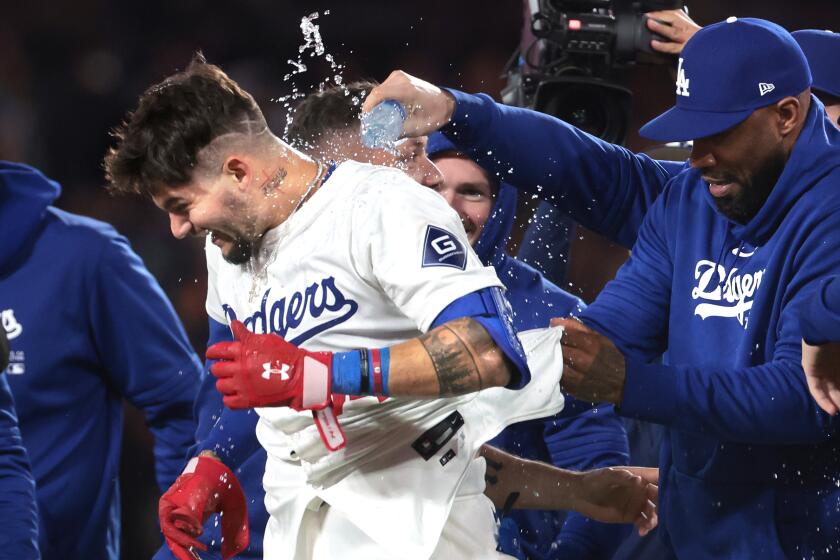Bribes, money laundering and the World Cup: What happens now with FIFA?
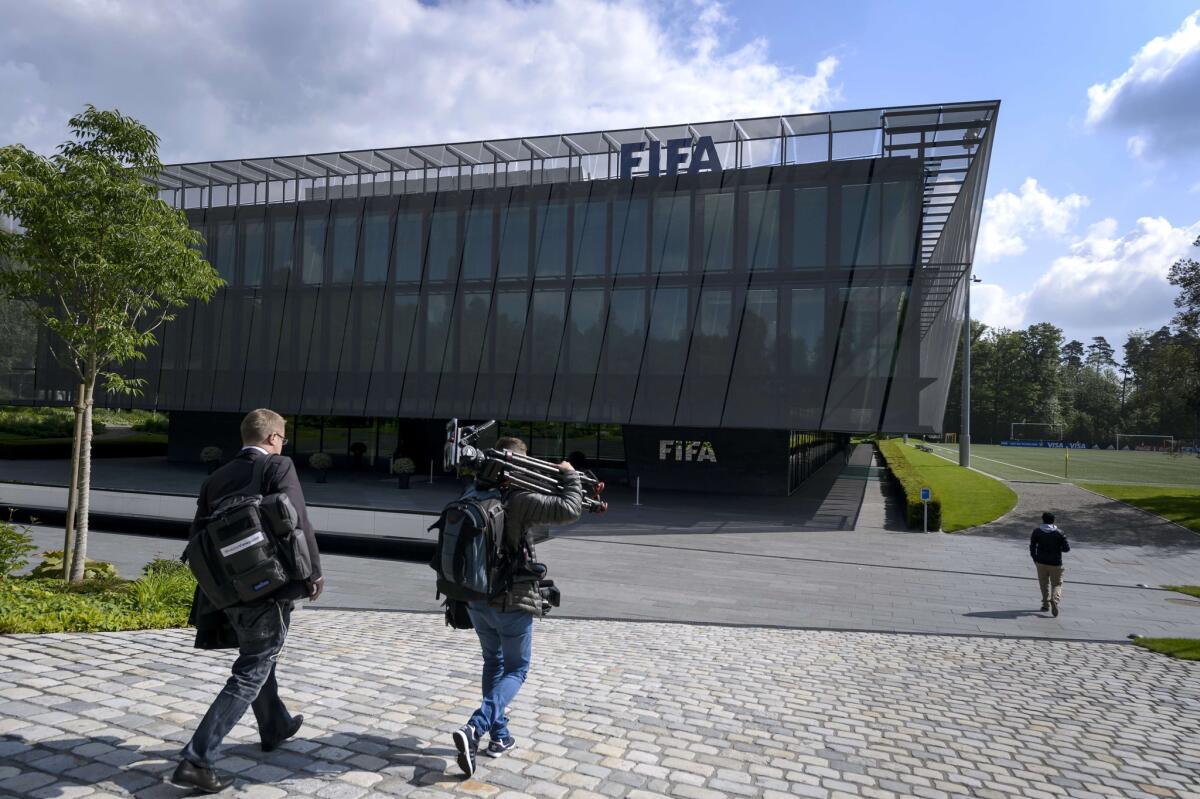
A TV crew arrives at
The U.S. Justice Department unveiled indictments Wednesday morning against 14 high-ranking officials with FIFA, world soccer’s governing body, who face charges of racketeering, wire fraud and money laundering following a three-year FBI investigation.
The indictment names 14 people, some of whom were arrested Wednesday morning in Zurich by Swiss police, acting on behalf of U.S. law enforcement personnel, at the start of FIFA’s annual meeting. But with the arrests and the indictments having led to more questions than answers, Times soccer writer Kevin Baxter attempts to make some sense out of the confusion:
Will this hurt the U.S. chances of hosting World Cups in the future?
Possibly. The U.S. was in line to stage the 2026 World Cup, partly as payback for losing the 2022 tournament to Qatar in a vote that was later shown to be rife with corruption. If Wednesday’s arrests and extradition are seen as unwelcome and heavy-handed American meddling in FIFA’s affairs, the U.S. Soccer bid could lose the support of delegates from countries in the developing world.
What will happen to Sepp Blatter?
We’ll find out Friday. Blatter has been wounded before, only to recover and serve four controversial terms as FIFA’s president. Opposition to his heavy-handed rule has been building, especially after FIFA quashed U.S. attorney Michael Garcia’s report on bribery and corruption around the votes that awarded the next two World Cups to Russia and Qatar. Garcia immediately resigned in protest while the 79-year-old Blatter declared he would run for a fifth term as FIFA president. That vote is scheduled for Friday. Blatter has been widely expected to beat back a challenge from Jordanian Prince Ali bin al-Hussein, who has promised to clean up the organization by making it more transparent.
Will this affect the World Cups that have already been awarded to Russia in 2018 and Qatar in 2022?
At this point, that appears unlikely. Both countries have invested billions in construction and other preparation for the tournaments; pulling the plug on that now would seriously harm what little credibility FIFA has left. However, as the Garcia report and a Sunday Times of London investigation have shown, the votes to award both those World Cups were tainted by corruption. If there’s an unknown bombshell revealed in the Justice Department indictment, FIFA’s executive committee may attempt to invalidate those votes and move one or both tournaments. But that would be a long shot.
Who are the officials arrested?
Among those charged are Jeffrey Webb from the Cayman Islands, Eugenio Figueredo of Uruguay, Jack Warner of Trinidad and Tobago, Eduardo Li of Costa Rica, Julio Rocha of Nicaragua, Costas Takkas of the Cayman Islands, Rafael Esquivel of Venezuela, Jose Maria Marin of Brazil and Nicolas Leoz of Paraguay. The fact that many are from CONCACAF -- the confederation overseeing soccer in North America, Central America and the Caribbean, and of which Webb is president -- may be partly explained by the fact that former CONCACAF general secretary Chuck Blazer cooperated with the FBI inquiry. According to the New York Daily News, Blazer secretly taped conversations with several officials at the 2012 London Olympics and other events to help the Justice Department build its case. Sports marketing executives in the U.S. and South America have also been accused of paying out more than $150 million in bribes.
Any surprising names there?
The Florida-educated Webb, a banker who was elected president of the Cayman Islands soccer federation in 1991, appeared to be a reformer after replacing the disgraced Jack Warner as CONCACAF president in 2012. Webb joined U.S. Soccer federation President Sunil Gulati in pushing for transparency in the way FIFA does business. Now, it appears as if Webb was really in favor of business as usual.
Does that mean CONCACAF is the most corrupt confederation?
Not necessarily. It may simply mean that the FBI’s access to Blazer made CONCACAF an easier target. Or that charges were easier to bring against people from the region because they tend to work with U.S. banks and other companies that leave them open to prosecution in U.S. courts.
What about U.S. Soccer, which also falls under the CONCACAF umbrella?
The association between U.S. Soccer and Blazer, a New Yorker who reportedly ran up more than $25 million in credit card debt while serving 17 years on the FIFA executive committee, makes this question a tough one. But we’re going to say that Gulati, the current U.S. Soccer president who replaced Blazer as the FIFA executive committee, is squeaky clean. An economics lecturer at Columbia University, Gulati has guided U.S. Soccer through a period of unparalleled growth. And he was among the first to call for the publication of the Garcia report -- but unlike Webb, Gulati appears to sincerely embrace the need for reform. Just 55, he appears destined for a more important role in both international and U.S. Soccer -- a future he isn’t likely to risk for any short-term gains.
Is this the start of a bigger operation against FIFA by the U.S. and other governments?
The Justice Department isn’t saying. But the FBI spent three years building its case, then acted in spectacular fashion by having Swiss authorities crash FIFA’s annual meeting to arrest and extradite six suspects. It’s unlikely the U.S. has a bigger card to play but it could provide information to authorities in other countries who may want to bring charges of their own.
What’s next?
If Blatter survives Friday’s election, as expected, he’s still likely to face enormous pressure to make substantial changes in the way FIFA does business. With so many federations pushing so many different agendas, it will impossible for FIFA to clean up all of them. However, Blatter can push FIFA’s business out in the open, making it more difficult for federations to buy and sell votes or other considerations with the public noticing.
Where will that pressure come from?
Follow the money. FIFA isn’t in the business of sports as much as it’s in the business of money. Its $1.5-billion bank account proves that. When a London newspaper exposed shady dealings around the votes for the 2018 and 2022 World Cup, FIFA tried to brush that aside until major corporate sponsors rose up and threatened to take their sponsorship dollars elsewhere. Blatter will soon be getting more harsh phone calls from the folks at Coca-Cola, Sony, McDonald’s and elsewhere -- phone calls he’s certain to take. And the message is likely to be the same: Federal indictments are never good for a sponsor’s image.
Follow Kevin Baxter on Twitter @KBaxter11
More to Read
Get our high school sports newsletter
Prep Rally is devoted to the SoCal high school sports experience, bringing you scores, stories and a behind-the-scenes look at what makes prep sports so popular.
You may occasionally receive promotional content from the Los Angeles Times.


